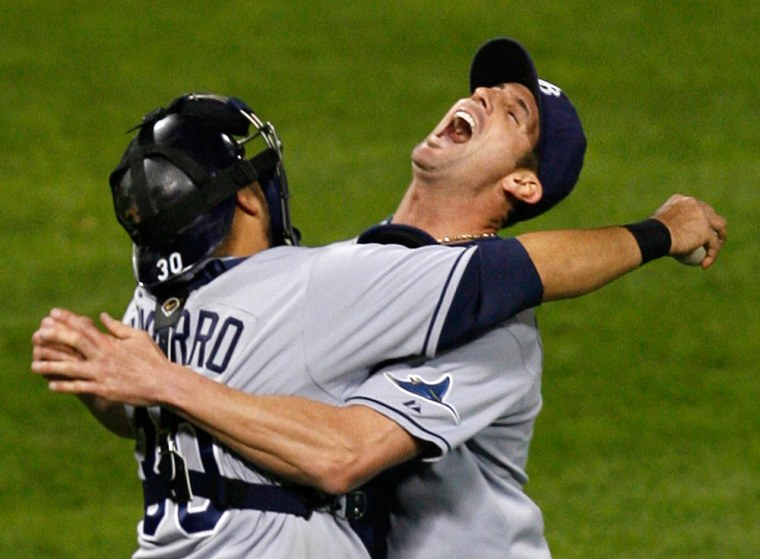Back in 1923, the New York Yankees built an entire stadium for $2.5 million. This past season, just one victory in their aging edifice cost the franchise almost as much: $2.3 million.
Those are some of the surprising numbers unearthed in an msnbc.com analysis of wins for each Major League Baseball team in 2008 compared to salaries paid to its players. As the one major sport without a salary cap, the cost-per-victory has some stunning winners – and embarrassing losers.
Just like last year, the Yankees spent the most per win in the major leagues. In retrospect, the $2,017,437 price for a victory in 2007 looks like a bargain; the franchise wasted more than $330,000 more per triumph in 2008 and didn’t even make the playoffs (the Yankees earned a wild-card spot last season). Of course, the Bronx Bombers’ $209 million payroll this season topped all 30 teams, as it almost always does.
Down in Florida, the story is different. Tampa Bay lost its perch as the lowest spender per win, a mark achieved in 2007 at $365,000 per victory. But Rays were happy to spend the higher $451,759 per win in 2008 (still second-lowest in baseball), as they made the playoffs for the first time in their decade of play. With success, they may find a low cost-per-win ratio hard to maintain in the future: no doubt the $412,000 salary of B.J. Upton, who stole 44 bases, will jump in the ensuing years.
Across the Everglades and down Route 95 sits the team with the lowest-cost-per-win in the majors: the Florida Marlins. They spent $259,661 for each victory.
Given that the minimum baseball salary in 2008 reached $390,000 per player, all teams were required to spend at least $9.75 million to field a 25-man roster; the Marlins didn’t earmark a whole lot more, shelling out less than $22 million to the entire squad. In fact, two Yankees by themselves – Alex Rodriguez ($28 million) and Jason Giambi ($23 million) – both earned more than all Marlins combined. Yet the Yankees won only five more games (89) than Florida.
The Mets spent more than $1.5 million per win merely to tantalize fans and to miss the playoffs at the last minute yet again. The Twins forked over about half that, $646,963 per victory – and suffered an even more painful playoff lockout by falling 1-0 to the White Sox in the 163rd game of the year.
Next to the Rays, the Brewers emerged as the second-best bargain among playoff teams, spending just under $900,000 per win. Their first-round counterparts, Philadelphia, paid a little more than $1 million for each of its 92 regular-season victories before knocking off Milwaukee in the division series.
No one can match the Yankees among high cost-per-win teams who failed to make the playoffs, but the pain is still acute in Seattle and Atlanta. The Mariners squandered more than $1.9 million for each win, second-highest in baseball; the Braves – who once captured 14 division titles in a row – blew more than $1.4 million per win to watch the playoffs at home.
How about the Oakland A’s, the paragon of Moneyball as recorded by Michael Lewis? They spent nearly $640,000 per win in 2008, far more than their low-cost heyday in the early part of the decade when they averaged $500,000 a victory and continually made the playoffs. (Back then, teams such as Baltimore and Texas were paying nearly $3 million a triumph just for the right not to go to the playoffs.)
The three top-spending teams – the Yankees, Mets and Tigers – all failed to make the postseason. However, the next five franchises on the list – the two Chicago teams, two Los Angeles teams and Boston – procured spots. Clearly, there is still an advantage for teams to pay high salaries to try to play in October, despite the rare exceptions such as the Rays. Look at the Dodgers – they traded for Manny Ramirez, one of the highest-paid players in baseball at $20 million per season, and have advanced in the playoffs after their season looked unsalvageable this summer.
Of course, some of the credit goes to a man who’s not part of this monetary equation: Joe Torre. The manager rejected what he considered a slap-in-the-face offer from the Yankees – a team he had led to a dozen straight playoff berths – and headed west. Next year, without Torre, the Yankees will move into a new $1.3 billion Yankee Stadium – and if their cost-per-win ever approaches that number, the tabloids will have the time of their lives.
